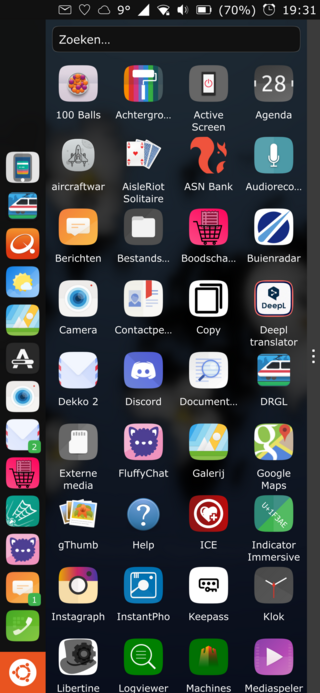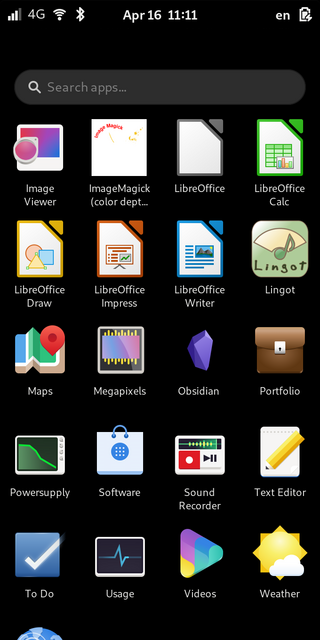
Xubuntu is a Canonical Ltd.–recognized, community-maintained derivative of the Ubuntu operating system. The name Xubuntu is a portmanteau of Xfce and Ubuntu, as it uses the Xfce desktop environment, instead of Ubuntu's customized GNOME desktop.

Ubuntu releases are made semiannually by Canonical Ltd, its developers, using the year and month of the release as a version number. The first Ubuntu release, for example, was Ubuntu 4.10 and was released on 20 October 2004. Consequently, version numbers for future versions are provisional; if the release is delayed until a different month than planned, the version number will change accordingly.

Ubuntu Touch is a mobile version of the Ubuntu operating system, being developed by the UBports community. Its user interface is written in Qt, and is designed primarily for touchscreen mobile devices such as smartphones and tablet computers, but the original goal of convergence was intended to bring Ubuntu Touch to laptops, desktops, IOT devices and TVs for a complete unified user experience.

Ubuntu Kylin is the official Chinese version of the Ubuntu computer operating system. It is intended for desktop and laptop computers, and has been described as a "loose continuation of the Chinese Kylin OS". In 2013, Canonical Ltd. reached an agreement with the Ministry of Industry and Information Technology to co-create and release an Ubuntu-based operating system with features targeted at the Chinese market.
Linux for mobile devices, sometimes referred to as mobile Linux, is the usage of Linux-based operating systems on portable devices, whose primary or only Human interface device (HID) is a touchscreen. It mainly comprises smartphones and tablet computers, but also some mobile phones, personal digital assistants (PDAs) portable media players that come with a touchscreen separately.

Librem is a line of computers manufactured by Purism, SPC featuring free (libre) software. The laptop line is designed to protect privacy and freedom by providing no non-free (proprietary) software in the operating system or kernel, avoiding the Intel Active Management Technology, and gradually freeing and securing firmware. Librem laptops feature hardware kill switches for the microphone, webcam, Bluetooth and Wi-Fi.

KDE neon is a Linux distribution developed by KDE based on Ubuntu long-term support (LTS) releases, bundled with a set of additional software repositories containing the latest versions of the Plasma 6 desktop environment/framework, Qt 6 toolkit and other compatible KDE software. First announced in June 2016 by Kubuntu founder Jonathan Riddell following his departure from Canonical Ltd., it has been adopted by a steadily growing number of Linux users, regularly appearing in the Top 20 on DistroWatch.com's popularity tables.
Pine Store Limited, known by its trade name Pine64, is a Hong Kong-based organization that designs, manufactures, and sells single-board computers, notebook computers, as well as smartwatch/smartphones. Its name was inspired by the mathematical constants pi and e with a reference to 64-bit computing power.

Purism, SPC is an American computer technology corporation based in San Francisco, California and registered in the state of Washington.

The Pinebook is a low-cost notebook developed by Hong Kong-based computer manufacturer Pine64. The Pinebook was announced in November 2016 and production started in April 2017. It is based on the platform of Pine64's existing Pine A64 single board computer, costing US$89 or US$99 for the 11.6" and 14" model respectively. Its appearance resembles the MacBook Air. The Pinebook is sold "at-cost" by Pine64 as a community service.

postmarketOS is an operating system primarily for smartphones, based on the Alpine Linux distribution.
Halium is a collaborative project to unify the Hardware Abstraction Layer for projects which run Linux on mobile devices with pre-installed Android. The project aims to standardize the middleware software used by various projects to talk with android daemons and make use of hardware on installed devices. It is distributed as free and open-source software under a mix of software licenses.

The PinePhone is a smartphone developed by Hong Kong-based computer manufacturer Pine64, intended to allow the user to have full control over the device. Measures to ensure this are: running mainline Linux-based mobile operating systems, assembling the phone with screws, and simplifying the disassembly for repairs and upgrades. LTE, GPS, Wi-Fi, Bluetooth and both cameras can be physically switched off. The PinePhone ships with the Manjaro Linux operating system using the Plasma Mobile graphic interface, although other distributions can be installed by users.

Pop!_OS is a free and open-source Linux distribution, based on Ubuntu, and featuring a customized GNOME desktop environment known as COSMIC. The distribution is developed by American Linux computer manufacturer System76. Pop!_OS is primarily built to be bundled with the computers built by System76, but can also be downloaded and installed on most computers.
The scope for this page is that used for list of open-source mobile phones.

Plasma Mobile is a Plasma variant for smartphones. It is currently available for the Pinephone, and supported devices for postmarketOS such as the OnePlus 6.

KDE Connect is a multi-platform application developed by KDE, which facilitates wireless communications and data transfer between devices over local networks. KDE Connect is available in the repositories of many Linux Distributions and F-Droid, Google Play Store for Android. Often, distributions bundle KDE Connect in their KDE Plasma desktop variant. KDE Connect has been reimplemented in the GNOME desktop environment as GSConnect, which can be obtained from Gnome Extension Store. Since 2021, KDE connect has also been available on Windows, and it is available as an unstable nightly build on macOS.

The PinePhone Pro is a smartphone developed by Hong Kong-based computer manufacturer Pine64. The phone is the successor to the PinePhone released in 2019. The default operating system is Sailfish OS. The device is a developer platform with open hardware specifications but with unfinished software. The target group of the device is free and open-source software developers who will develop the software. The device was first shipped to developers in December 2021, and in February 2022 devices were made available to consumers.

Mobian is a project to port the Debian GNU/Linux distribution running the mainline Linux kernel to smartphones and tablets. The project was announced in 2020. It is available for the PinePhone, PineTab, Librem 5, OnePlus 6/6T and Pocophone F1. Droidian is a version of Mobian which runs top of Android's variant of the Linux kernel and the Libhybris and Halium adaptation layer, and works with devices which are supported by Ubuntu Touch. It can be installed using UBports installer.
















